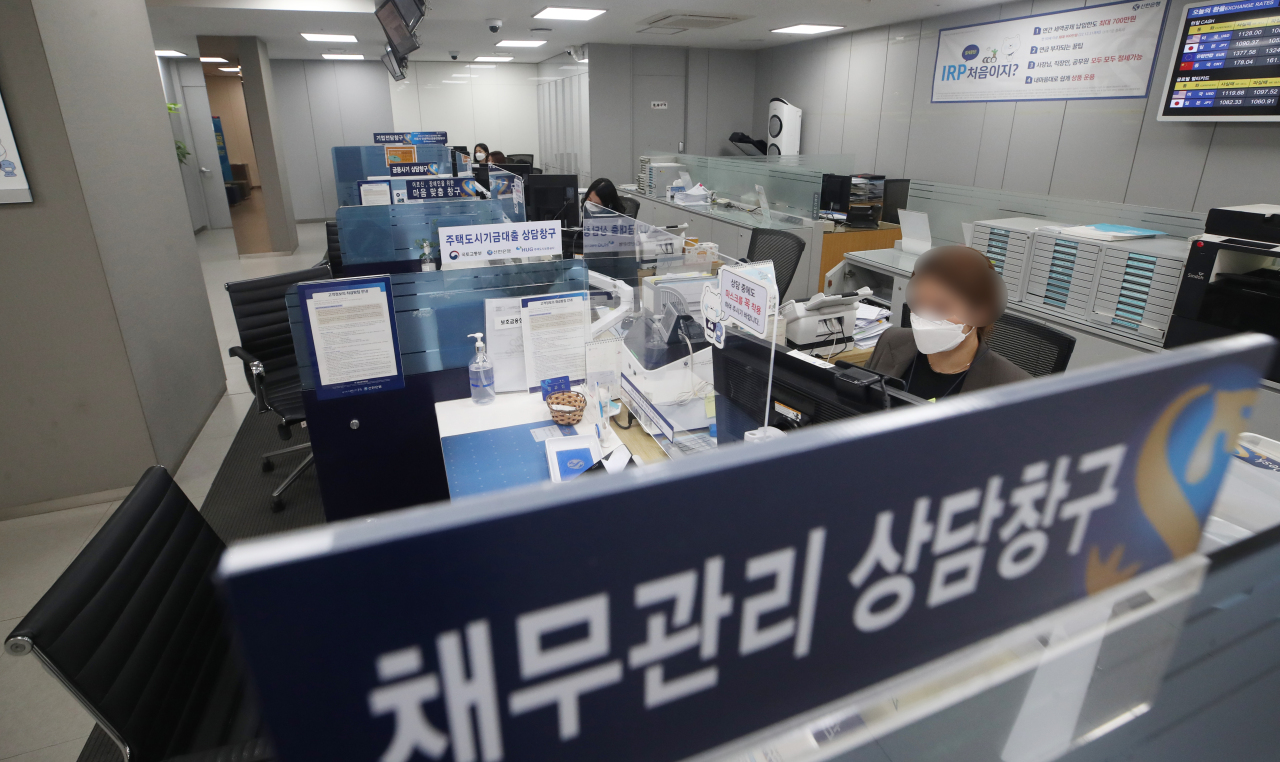
SEJONG -- The year of 2020 is expected to record as one of the few years, where a fever of buying apartments and stocks by taking out financial loans swept over the nation.
The phenomenon was triggered by skyrocketing real estate prices in the wake of a housing shortage and sharp rebound in the Kospi despite the still high infections of novel coronavirus.
Though the fourth-quarter data has yet to be compiled, the figure for the January-September of last year is suggesting that more and more Korean households were active in borrowing, which were mostly aimed at investments rather than raising money for living expenses.
According to the Bank of Korea, the outstanding household debt -- the total of financial loans plus credit card-based payment services extended to households -- came to an all-time high of 1,682.1 trillion won ($1.51 trillion) as of September 2020.
Given the figure of 1,166 trillion won as of September 2015, the outstanding debt held by the household sector surged 516.1 trillion won, or 44.2 percent, in only five years.

The total also posted an 18.5 percent climb during the term of the Moon Jae-in administration roughly, as the figure for September 2017 stayed at 1,419.1 trillion won. President Moon took office in May 2017.
As Moon had continued to pledge to stabilize the property market during the early stage of his tenure, a large portion of households were estimated to have delayed their plan to purchase homes.
But the apartment prices in Seoul and major cities grew 50-100 percent, sometimes more, in only two or three years, despite a series of “anti-speculation” measures from the government.
As a result, Koreans in 20s and 30s hurried to buy homes, taking out huge mortgages or as much credit-based loans and other forms of financing as possible. This was based on their sentiment that they might never be able to purchase an apartment if they wait any longer.
“Prices of some apartment complexes in Sejong climbed up to 100 percent in only a year (between 2019 and 2020),” said a resident in the administrative city in her 50s.
Saying that her apartment also posted a similar price increase, the resident said she were sorry to younger people.
“The irrational prices have caused lack of motivation at workplaces and harmed the value of labor.”
In addition, opening of stock trading accounts actively spread to people in their 20s or those in their 60s or over last year amid record-breaking Kospi performance thanks to financial authorities’ suspension of short-selling since March.
Many of them reportedly invested in stocks by closing installment savings accounts or taking out credit loans or housing-collateralized loans.
In the latest research from the Organization for Economic Cooperation and Development on the ratio of household debt to net disposal income for 33 members, Korea ranked sixth. The OECD compared 2019 or 2018 figures, while it did not include data for four of its 37 members -- Iceland, Israel, Mexico and Turkey.
Korea posted 191 percent in the ratio of household debt to disposable income in 2019, a growth of about 30 percentage points compared to 2010.
The figure contrasted with the debt-to-disposable income ratio of 107 percent in Japan and 105 percent in the US.
The countries that posted a ratio under 100 percent, which indicates relatively decent financial soundness in their household sector, are Greece (98 percent), Germany (96), Austria (90), Italy (88), Estonia (76), Chile (73), Poland (63), Slovenia (55), Colombia (47), Hungary (42) and Latvia (41).
Korea has recently overtaken Luxembourg with 190 percent and Sweden with 188 percent, both of which had recorded higher ratios.
By Kim Yon-se (kys@heraldcorp.com)









![[Kim Seong-kon] Democracy and the future of South Korea](http://res.heraldm.com/phpwas/restmb_idxmake.php?idx=644&simg=/content/image/2024/04/16/20240416050802_0.jpg&u=)







![[KH Explains] Hyundai's full hybrid edge to pay off amid slow transition to pure EVs](http://res.heraldm.com/phpwas/restmb_idxmake.php?idx=652&simg=/content/image/2024/04/18/20240418050645_0.jpg&u=20240418181020)

![[Today’s K-pop] Zico drops snippet of collaboration with Jennie](http://res.heraldm.com/phpwas/restmb_idxmake.php?idx=642&simg=/content/image/2024/04/18/20240418050702_0.jpg&u=)